James Murray and his girlfriend waited four days for help without power or water at their permaculture farm in New Taipei City’s Wulai District (烏來).
It was 2015 and Typhoon Soudelor had just devastated the area, causing massive landslides that trapped them on their farm until they were rescued by the military. Unable to return due to the destruction and a dispute with the landlord regarding repairs, they had to start over with a much smaller garden.
Murray is making the most of his new site by making products and hosting workshops and garden-to-table lunches, but he wants a larger live-in farm that can allow him to quit his teaching job. Since permaculture farming requires the creation of sustainable ecosystems and habitats, Murray faces more environmental restrictions than typical farmers.
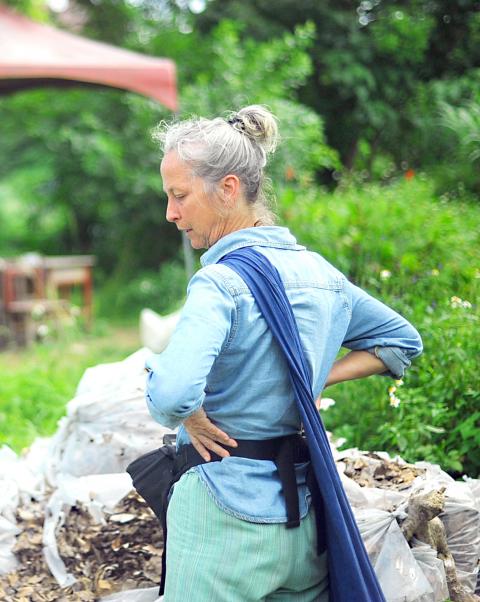
Photo: Han Cheung, Taipei Times
Due to the time and effort it takes to set things up, land security is also a big factor, making his search especially difficult in a country where available and accessible farmland is scarce.
Murray is a student of long-term expat Tammy Turner who, along with a handful of other like-minded people, are on a mission to show that permaculture is not only eco-friendly and sustainable, but can also provide a deeper understanding of the relationship between humans, food and nature. Turner has been slowly making headway with several ventures across the country, but obstacles still remain.
“The [permaculture] scene, if anything, is hampered by access to land,” Turner says.
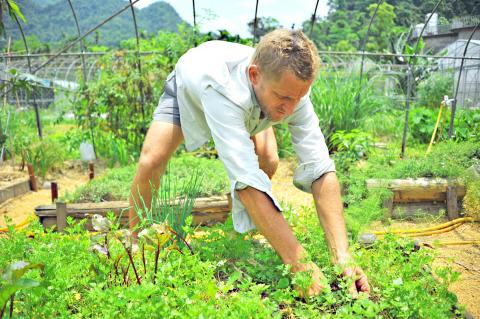
Photo: Han Cheung, Taipei Times
LAND WOES
Murray’s garden doesn’t look like a garden. Instead of neat rows of the same crop, it features diverse groupings of plants that work well with each other for a variety of reasons — soil health, shade, pest control and biodiversity. Murray’s plants sit in raised beds on a layer of sheet mulch, which stores nutrients, provides insulation and prevents runoff, reducing the need to water and eliminating fertilizer.
His plots appear unorganized, but when the system is properly executed it largely runs itself.
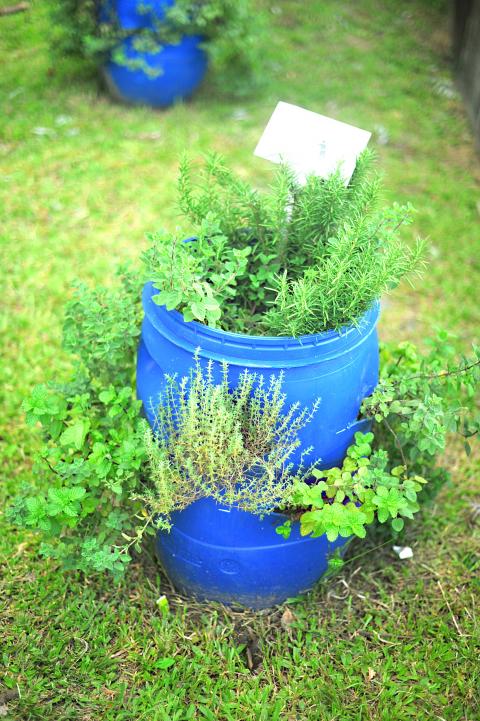
Photo: Han Cheung, Taipei Times
But land quality is an obstacle, he says. Typically farmers in Taiwan grow only one or two crops, which leads to low biodiversity and problematic soil. Additionally, the soil is also harmed due to the overuse of chemical fertilizers and pesticides. At Murray’s original site, he had to deal with two truckloads of garbage, piles of burnt plastic and dumped pesticides.
Murray says the first step is to “regenerate” the clay soil to make it more fertile and microbe-rich. It also takes a while to get his ecosystems into a predator-prey balance.
“After one-and-a-half years, it’s getting there,” he says.
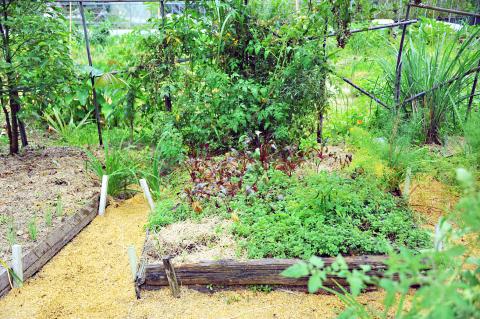
Photo: Han Cheung, Taipei Times
Turner says that a potential permaculture farmer can often only rent the land for a number of years, making a long-term investment risky. Since it could take years to set up a permaculture farm’s ecosystems, practitioners are hit harder when they are forced to give up their land.
Neighbors matter too. Murray says his old landlord cut down an entire swath of jungle to plant a single crop of trees, which not only affected his ecosystem but made the area more prone to landslides, which he believes exacerbated the typhoon damage. At his new spot, he’s dealing with the heavy use of pesticides by neighboring farmers.
But he has also influenced some of their practices. Instead of raking leaves and burning them, his landlord now leaves them for him for composting.
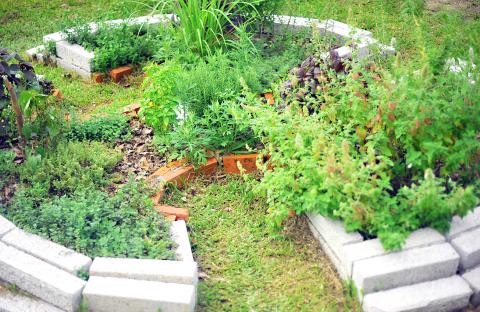
Photo: Han Cheung, Taipei Times
BEYOND FARMING
Not having land doesn’t mean that one cannot practice permaculture or enjoy its benefits.
Lan Pei-chen (藍珮禎) has a regular job but volunteers with and takes classes from Turner. Lan says she first joined because she wanted to learn more about where her food comes from and eat healthier, but now it has become a passion. She also harvests crops for her own use.
As a gift designer and hotel decorator, Lan says she was bothered by the fact that her products were often not recyclable or biodegradable. Through her increased knowledge of plants and ecology, she begin using organic materials in her designs.
“I can’t practice permaculture fully because I don’t have land, but I feel like I’ve learned even more by applying the principles to my life,” she says. “And there’s always more to learn.”
Community
Turner’s latest endeavor is a demonstration herbal garden at Yonghe’s 823 Memorial Park, which not only draws public attention to permaculture but does so in an urban rather than rural setting. Turner ultimately hopes to develop a network of community-supported gardens as one solution to the land issue.
Murray hosts workshops such as composting, and he also likes to give visitors plant cuttings to grow at home to pique their interest. Other ways to connect with the public includes selling crops and products at farmers’ markets and hosting garden-to-table lunches. His products, such as basil pesto, are strictly seasonal, another permaculture concept he hopes to promote. He hopes to one day bring permaculture to big businesses and large-scale operations.
Turner currently teaches a number of students who work on government projects, and hopes that they will help her gain more institutional support for permaculture.
“As long as the government gives a seal on it, then the farmers will more likely try it,” she says.

Last week, the the National Immigration Agency (NIA) told the legislature that more than 10,000 naturalized Taiwanese citizens from the People’s Republic of China (PRC) risked having their citizenship revoked if they failed to provide proof that they had renounced their Chinese household registration within the next three months. Renunciation is required under the Act Governing Relations Between the People of the Taiwan Area and the Mainland Area (臺灣地區與大陸地區人民關係條例), as amended in 2004, though it was only a legal requirement after 2000. Prior to that, it had been only an administrative requirement since the Nationality Act (國籍法) was established in

Three big changes have transformed the landscape of Taiwan’s local patronage factions: Increasing Democratic Progressive Party (DPP) involvement, rising new factions and the Chinese Nationalist Party’s (KMT) significantly weakened control. GREEN FACTIONS It is said that “south of the Zhuoshui River (濁水溪), there is no blue-green divide,” meaning that from Yunlin County south there is no difference between KMT and DPP politicians. This is not always true, but there is more than a grain of truth to it. Traditionally, DPP factions are viewed as national entities, with their primary function to secure plum positions in the party and government. This is not unusual

More than 75 years after the publication of Nineteen Eighty-Four, the Orwellian phrase “Big Brother is watching you” has become so familiar to most of the Taiwanese public that even those who haven’t read the novel recognize it. That phrase has now been given a new look by amateur translator Tsiu Ing-sing (周盈成), who recently completed the first full Taiwanese translation of George Orwell’s dystopian classic. Tsiu — who completed the nearly 160,000-word project in his spare time over four years — said his goal was to “prove it possible” that foreign literature could be rendered in Taiwanese. The translation is part of

The other day, a friend decided to playfully name our individual roles within the group: planner, emotional support, and so on. I was the fault-finder — or, as she put it, “the grumpy teenager” — who points out problems, but doesn’t suggest alternatives. She was only kidding around, but she struck at an insecurity I have: that I’m unacceptably, intolerably negative. My first instinct is to stress-test ideas for potential flaws. This critical tendency serves me well professionally, and feels true to who I am. If I don’t enjoy a film, for example, I don’t swallow my opinion. But I sometimes worry